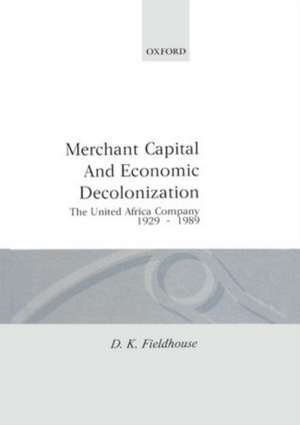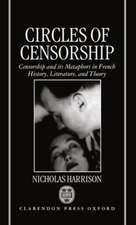Merchant Capital and Economic Decolonization: The United Africa Company 1929-1987
Autor D. K. Fieldhouseen Limba Engleză Hardback – dec 1994
Preț: 1095.98 lei
Preț vechi: 1652.99 lei
-34% Nou
Puncte Express: 1644
Preț estimativ în valută:
209.71€ • 219.55$ • 173.53£
209.71€ • 219.55$ • 173.53£
Carte tipărită la comandă
Livrare economică 25-31 martie
Preluare comenzi: 021 569.72.76
Specificații
ISBN-13: 9780198226253
ISBN-10: 019822625X
Pagini: 864
Ilustrații: tables
Dimensiuni: 158 x 243 x 50 mm
Greutate: 1.37 kg
Editura: Clarendon Press
Colecția Clarendon Press
Locul publicării:Oxford, United Kingdom
ISBN-10: 019822625X
Pagini: 864
Ilustrații: tables
Dimensiuni: 158 x 243 x 50 mm
Greutate: 1.37 kg
Editura: Clarendon Press
Colecția Clarendon Press
Locul publicării:Oxford, United Kingdom
Recenzii
great book, which tells the story of the UAC from 1929...this is a splendid volume, in every way worthy of the Emeritus Professor of Imperial and Naval History in the University of Cambridge
this book does justice to the substantial corporate archives of a major business...a book that emphasises the importance of corporate enterprise is very welcome.
The first detailed study of the United Africa Company ... The major contribution of the book ... is the new dimensions it raises for the study of decolonization.
Fieldhouse ... offers us in this weighty volume a detailed history of the United Africa Company from its formation to its dissolution. Fieldhouse was given access to the massive private documentation possessed by the company ... we are all in his debt for the sheer weight of important information that is now available to historians of West Africa ... This is an immensely useful (and gracefully written) volume to which an entire article or articles could well respond in review.
a work of...importance. The book fills out in a most necessary way the commercial and industrial history of west Africa (more particularly, of Ghana and Nigeria) over some six decades...theorists of economic imperialism and neo-colonialism...should read this book. Many others, who do not fall into that category, will welcome its appearance.
the main strength of this book is that...it contains an extraordinary amount of information about UAC...Unilever must be congratulated for allowing such liberal access to its archives, while the stamina of Fieldhouse in researching and writing such a tome is impressive...Business historians will find this book to be a goldmine of empirical information...informative history of one of Britain's more important overseas businesses in this century.
A wide range of specialists will find this work very useful in their research, By opening this private archive, Fieldhouse has uncovered a treasure trove of information...Researchers will be mining this book for these sources for years to come.
The historiography of British commercial enterprise in West Africa is longstanding and distinguished. D. K. Fieldhouse is not new to this canon, but his new study adds to this lustre through the light it sheds both on important aspects of the end of the West African empire, and the transition to post-colonialism....'Merchant Capital and Economic Decolonization' will be required reading for anybody interested in the end of African empire, even if most will fail the test of reading each page with equal devotion. ... With the lucidity, tenacity and sense of clearly-framed goals which have been the hallmark of Fieldhouse's work as a historian, he has added to his achievements by making a major contribution to the study of the process by ehich empire at first faltered and was finally transfigured into something else.
Fieldhouse has told the story of the UAC well. Archives may not fall so neatly into the hands of other historians, but there are equivalent tales to be told for the World Bank. the IMF, and the firms that dominate African economic life now that the UAC is gone.
This is an advanced book which is intended for graduate-level and professional researchers who already have hypotheses which they can bring to bear on the information which Fieldhouse has uncovered here.
One opens this tome with the highest expectations, which it meets. This important book contains a fabulous amount of valuable material on an extremely complex multinational, multifunctional, multiproduct corporation. Fieldhouse is to be applauded for undertaking this project ... Fieldhouse tells a fascinating story of the participation of UAC/Unilever in West African industrialization ... offers valuable insights into how UAC became caught up in the kaleidoscopic political conditions in West Africa after independence. This outstanding book should be required reading for any student of economic development. It demonstrates the value of business history, especially the history of multinational enterprise, in viewing development issues. It is a major contribution to the economic history of West Africa.
David Fieldhouse must be congratulated. He has opened up the files of what Sir Keith Hancock described as 'the commercial colossus of West Africa' ... he has also wirtten a monumental account of the United Africa Company ... Fieldhouse devotes over fifty interesting pages to the question of the 'pools' and cocoa which add considerably to our understanding of this complex matter.
it is essential to note its many impressive achievements ... Fieldhouse uses the archive of the United Africa Company, an obviously rich body of records, to chart the history of the largest and most powerful of trhe great export-import firms in West Africa ... It is surely destined for inclusion among the classic studies of West African economic history.
this is a significant addition to the small number of good business histories of British concerns operating in Africa and an important contribution to literature on economic aspects of colonialism and African economic developments ... this study will be eagerly received for the light it sheds upon controversies surrounding European capital ... Merchant capital and economic decolonization ... advances our understanding of the activities of merchant capital on a number of fronts ... taken as a whole it offers an important contribution to our knowledge of the changing profile of British business overseas. The book is throughout written in Fieldhouse's characteristically accessible prose.
this book does justice to the substantial corporate archives of a major business...a book that emphasises the importance of corporate enterprise is very welcome.
The first detailed study of the United Africa Company ... The major contribution of the book ... is the new dimensions it raises for the study of decolonization.
Fieldhouse ... offers us in this weighty volume a detailed history of the United Africa Company from its formation to its dissolution. Fieldhouse was given access to the massive private documentation possessed by the company ... we are all in his debt for the sheer weight of important information that is now available to historians of West Africa ... This is an immensely useful (and gracefully written) volume to which an entire article or articles could well respond in review.
a work of...importance. The book fills out in a most necessary way the commercial and industrial history of west Africa (more particularly, of Ghana and Nigeria) over some six decades...theorists of economic imperialism and neo-colonialism...should read this book. Many others, who do not fall into that category, will welcome its appearance.
the main strength of this book is that...it contains an extraordinary amount of information about UAC...Unilever must be congratulated for allowing such liberal access to its archives, while the stamina of Fieldhouse in researching and writing such a tome is impressive...Business historians will find this book to be a goldmine of empirical information...informative history of one of Britain's more important overseas businesses in this century.
A wide range of specialists will find this work very useful in their research, By opening this private archive, Fieldhouse has uncovered a treasure trove of information...Researchers will be mining this book for these sources for years to come.
The historiography of British commercial enterprise in West Africa is longstanding and distinguished. D. K. Fieldhouse is not new to this canon, but his new study adds to this lustre through the light it sheds both on important aspects of the end of the West African empire, and the transition to post-colonialism....'Merchant Capital and Economic Decolonization' will be required reading for anybody interested in the end of African empire, even if most will fail the test of reading each page with equal devotion. ... With the lucidity, tenacity and sense of clearly-framed goals which have been the hallmark of Fieldhouse's work as a historian, he has added to his achievements by making a major contribution to the study of the process by ehich empire at first faltered and was finally transfigured into something else.
Fieldhouse has told the story of the UAC well. Archives may not fall so neatly into the hands of other historians, but there are equivalent tales to be told for the World Bank. the IMF, and the firms that dominate African economic life now that the UAC is gone.
This is an advanced book which is intended for graduate-level and professional researchers who already have hypotheses which they can bring to bear on the information which Fieldhouse has uncovered here.
One opens this tome with the highest expectations, which it meets. This important book contains a fabulous amount of valuable material on an extremely complex multinational, multifunctional, multiproduct corporation. Fieldhouse is to be applauded for undertaking this project ... Fieldhouse tells a fascinating story of the participation of UAC/Unilever in West African industrialization ... offers valuable insights into how UAC became caught up in the kaleidoscopic political conditions in West Africa after independence. This outstanding book should be required reading for any student of economic development. It demonstrates the value of business history, especially the history of multinational enterprise, in viewing development issues. It is a major contribution to the economic history of West Africa.
David Fieldhouse must be congratulated. He has opened up the files of what Sir Keith Hancock described as 'the commercial colossus of West Africa' ... he has also wirtten a monumental account of the United Africa Company ... Fieldhouse devotes over fifty interesting pages to the question of the 'pools' and cocoa which add considerably to our understanding of this complex matter.
it is essential to note its many impressive achievements ... Fieldhouse uses the archive of the United Africa Company, an obviously rich body of records, to chart the history of the largest and most powerful of trhe great export-import firms in West Africa ... It is surely destined for inclusion among the classic studies of West African economic history.
this is a significant addition to the small number of good business histories of British concerns operating in Africa and an important contribution to literature on economic aspects of colonialism and African economic developments ... this study will be eagerly received for the light it sheds upon controversies surrounding European capital ... Merchant capital and economic decolonization ... advances our understanding of the activities of merchant capital on a number of fronts ... taken as a whole it offers an important contribution to our knowledge of the changing profile of British business overseas. The book is throughout written in Fieldhouse's characteristically accessible prose.










